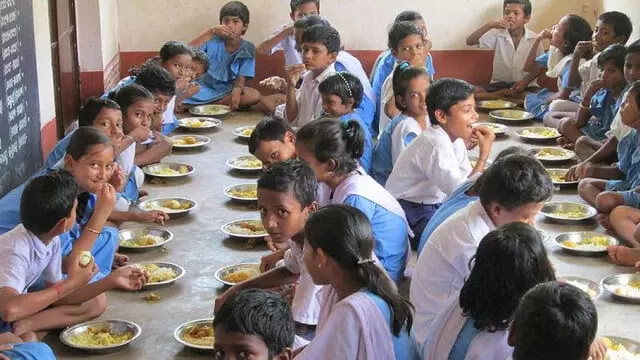Rising food poisoning in Telangana hostels puts govt's safety standards in spotlight
Institution-level food safety committees have been constituted in all schools, hostels, residential schools and Anganwadi centres
By Anoushka Caroline Williams
Representational Image.
Hyderabad: Food poisoning cases in Telangana’s government schools and hostels have risen alarmingly this year, putting a spotlight on the State’s food safety measures. Multiple incidents across districts have left hundreds of students hospitalised, with some cases even resulting in fatalities.
Despite the government’s introduction of Standard Operating Procedures (SOPs) for food safety, enforcement remains a challenge. From contaminated meals to unhygienic conditions in kitchens, the recurring incidents highlight systemic lapses.
CM Revanth Reddy orders stringent measures
In response to the rising cases, chief minister A Revanth Reddy expressed anger over the negligence and directed district collectors to treat students in government schools, hostels and Gurukuls as their own children. He emphasised the importance of providing nutritious food in hygienic conditions and conducting regular inspections.
“Despite repeated warnings, errors continue. Those responsible for negligence will be removed from service,” the CM stated during a recent review meeting. He also warned against misinformation being spread to defame the government.
Implementation of Standard Operating Procedures (SOPs)
The Telangana government introduced SOPs in September to improve food safety in Kasturba Gandhi Balika Vidyalayas (KGBVs) and urban residential schools. These guidelines include steps for food preparation, storage and serving to minimise risks of contamination.
A senior official from the Telangana School Education Department explained, “The SOP ensures students receive nutritious and safe meals to support their well-being and academic performance. We are implementing it phase-wise, and an orientation programme was recently conducted for schools.”
However, reports indicate that enforcement remains weak. Self-help groups tasked with preparing meals often fail to follow cleanliness guidelines, and monitoring mechanisms are inconsistent.
Recent food poisoning incidents
A series of food poisoning cases reported this year exposed the gravity of the issue:
• August 7, 2024: 40 boys from a minority English medium school in Jadcherla fell ill.
• August 6, 2024: A student died and two students were bitten by snakes in Karimnagar Gurukul schools.
• August 5, 2024: 16 girls in a Nagarkurnool residential school were hospitalised.
• April 17, 2024: A sixth-grade boy in a social welfare residential school in Bhuvanagiri died of suspected food poisoning.
• September 29, 2023: 216 of 470 students at an ashram in Nagarkurnool reported food poisoning symptoms.
Contaminated food, leftovers and unhygienic practices are common factors in these incidents. In some cases, insects, lizards and rats were found in the kitchens or meals.
Scheduled Caste development department initiatives
The Scheduled Caste Development Department issued a memo on November 27, 2024, outlining steps to enhance food safety in government institutions.
The memo emphasised the government’s commitment to children’s holistic development through nutritious meals prepared in hygienic conditions. To address food safety concerns:
1. Institution-level food safety committees have been constituted in all schools, hostels, residential schools and Anganwadi centres.
2. The committees, led by the head of the Institution (e.g., headmaster, principal or warden) and two other staff members, will:
• Inspect storerooms and kitchens before every meal to ensure the quality of provisions and hygiene.
• Taste food before serving to ensure its safety.
3. Daily photographic records of inspections and food quality checks must be maintained until a mobile app for instant uploads is launched.
District collectors are tasked with assigning supervisory officers to visit institutions, inspect food preparation processes and share photographic evidence at the district level.
Chief Secretary Santhi Kumari reiterated the importance of these measures, stating, “The safety and well-being of children are paramount. Every step will be taken to ensure hygienic and nutritious food in all institutions.”
Challenges in enforcement
According to officials, the lack of manpower, inadequate training and poor monitoring are key reasons for the recurring incidents. While the SOPs and food safety committees aim to improve conditions, their implementation remains inconsistent.
Government’s commitment
Chief Minister Revanth Reddy reminded officials that the government has increased diet changes to improve food quality and recruited thousands of teachers to enhance education standards. However, he made it clear that negligence in food safety will not be tolerated.
The government has also urged parents and the public to report any irregularities in food safety through official channels. “Children’s health and safety are a shared responsibility and collective efforts are needed to address these issues effectively,” said the CM.
With food poisoning cases turning into a public health crisis, experts and parents emphasise the need for strict enforcement of SOPs, regular inspections and accountability at all levels. The government’s initiatives must be supported by consistent monitoring to ensure that students in Telangana’s schools and hostels receive safe and nutritious meals.